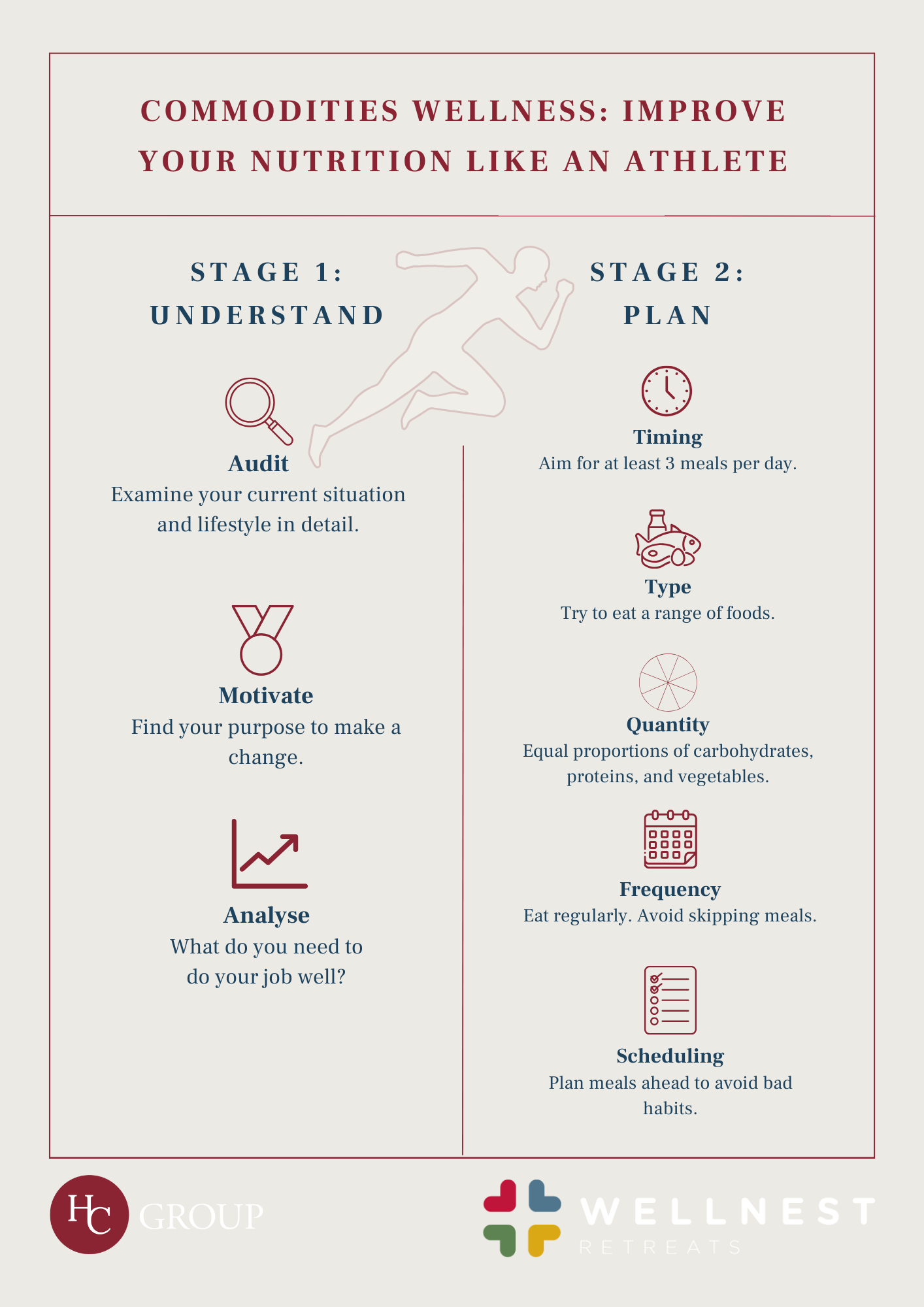Around 85% of energy and commodities trading professionals experienced periodic burnout in 2023. More than 70% reported sleeplessness due to workload - according to research by HC Group of around 100 professionals. In high-pressure corporate environments, a good diet can be among the first things to suffer. This can add to stress.
In the latest of our guides on workplace wellbeing, HC Insider spoke to Dr Julien Louis, Reader in Nutrition and Exercise Physiology at Liverpool John Moores University, and member of the Scientific and Ethical Committee at Wellnest Retreats – an organisation that promotes wellness in the commodities world. Dr Louis explains why a good diet is essential for wellness, and the steps people can put in place to support it.
HC Insider: As commodities professionals and organisations become more aware of the importance of workplace wellness, why is nutrition such as significant factor?
Dr Julien Louis: In a world of constant acceleration, there has never been a better time to review our lifestyles and work on ourselves and our community to improve our health and optimize our overall performance, benefitting both employers and employees.
At Wellnest we believe in the interconnection between nutrition and the other pillars of well-being: sleep, physical activity and mental health. For example, it is well established that dietary choices in the evening will impact sleep quality the following night, and sleep quality will influence dietary behaviour the following day.
Wellnest Retreats is a Strategic Partner of HC Group.
Together, we believe workplace wellness can support both commodities teams and wider organisations to thrive.
Learn more about our partnership
Request a call from our team about Wellnest Retreats’ solutions
HC Insider: As part of your work you spend time with elite athletes looking at their diet. What can corporate professionals learn from you work?
Dr Louis: In sport, the interest in nutrition is growing amongst athletes and support staff who understand how it can support performance. It can even sometimes make the difference between winning and losing: 15% of elite endurance athletes report at least one symptom of moderate to severe gastrointestinal distress in competition.
Practicing race nutrition strategy is key to develop physiological adaptation required to replicate it in a race. Similarly, people in the workplace should implement a balanced diet including regular intakes of carbohydrates to maintain their energy level throughout the day. Timing is key to avoid periods of low blood glucose generally associated with physical and cognitive fatigue. I believe people in the workplace can also naturally benefit from similar nutrition strategies to maintain or gain muscle mass or lose fat mass typically utilised in athletes.

Like elite athletes, everybody also has different needs, must deal with different workloads, and demanding tasks both physical and cognitive. To perform maximally, whilst staying in good health, every person in the workplace can work in the same way as athletes and adhere to similar individualised dietary routines.
HC Insider: What steps should professionals in the corporate world take to improve their nutrition?
Dr Louis: Having a routine and planning accordingly allows more control over your diet and lifestyle overall, thus avoiding stress, enhancing performance and wellbeing. Here’s how you can make that happen.
Stage 1: Understand your diet
Audit
Begin with an audit of your current situation and lifestyle. Do you think you have a healthy lifestyle? Are you happy with your diet? What is your energy level at the office and at home? Are you fatigued or perhaps stressed?
Motivate
If you are not happy with the current situation and wish to make a change, are you motivated to do so? Think of your motivation or your “why”. Indeed, you will need to find purpose to make changes and convert them into new healthy habits.
Analyse
Consider analysing - or ask a professional to analyse - the constraints of your activity. What does it take – both physically and mentally - to be good at your job? Here you need to think about number of hours seated, number of steps a day, and performance indicators such as vigilance, concentration, and perhaps overcoming jetlag from time to time.
Stage 2: Plan your diet
When you understand the energetic demands of your job, you can start working on your diet. To do this, you must consider five important aspects:
Timing
Overall, you should aim for at least 3 meals (breakfast, lunch and dinner) and 1 afternoon snack per day. Frequent meals evenly spaced implemented on a daily basis will bring a constant flow or energy to avoid episodes of fatigue or lethargy during the day. It will also facilitate sleep.
Type
Each meal should provide carbohydrates (e.g. from bread, for rice, pasta, fruits), proteins (e.g. from meat, fish, soy, legumes, eggs, and dairies), and good lipids (e.g. olive oil, rapeseed oil, mixed nuts). Vegetables and fruits are key to bring the small vital elements that are the vitamins and minerals.
Quantity
In a regular sized plate, carbohydrates, proteins, and vegetables should be present in equal proportions, in other words a third of the plate at each meal. For breakfast, fruits can replace the vegetable portion. Lipids are already present in meat, fish, dairies, and eggs, and must be complemented with olive or rapeseed oil (one tablespoon per meal).
Snacks must be small and mainly made of protein sources (e.g. one Greek-style yogurt), slow carbohydrates (e.g. one fruit), and/or good sources of fat (e.g. one small handful of mixed nuts).
Frequency
It is crucial not to skip meals in order to maintain a high metabolism. Extra calories are burnt through digestion every time you have a meal or snack. On the contrary, skipping a meal will slow your metabolism down (i.e. lower resting energy expenditure), thus accentuating calory retention in the following meals, which can lead to fat mass gain over time.
Planning
All meals and snacks must be planned ahead to avoid getting back to old habits. For example, if there is no canteen in the workplace, you need to think about solutions to implement your new healthy diet. This could include preparing meals that can be microwaved at the office, identifying restaurant options with healthy menus, selecting healthy snacks in the local café, ordering a selection of healthy snacks from catering for meetings, always having some snacks and water in the office. [HK1]
‘Cheat meals’ - food with friends, colleagues, or family in social venues, in which there is no limitation in the type of food selected - should ideally be planned too to limit their occurrence. We can imagine one or two of these meals per week.
HC Insider: How can employers help employees to improve their nutrition?
Dr Louis: Implementing and keeping a healthy diet at work is easier when the environment is conducive to it. Solutions to improve the adherence to dietary recommendation may include promoting the availability of healthy food and drink options – such as a healthy menu in workplace canteens, including sustainable choices with less meat and processed foods, and healthy snack options in the café or vending machines.
It can also help to if employers provide an opportunity for staff to consume a healthy diet daily - like frequent breaks within the day including a proper lunch break. This should be a time during which employees can take at least 30 minutes to have lunch in a dedicated space. Healthy snacks in meetings, water dispensers, having a staff kitchen with fridge, microwave and boiler can also help.
Employers can also help through the promotion of eating well initiatives, such as a vegetarian day once a week at the canteen, as well as workshops and information session with nutrition experts.

